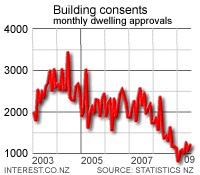Building consents dive in October to 1 per day in Auckland
Residential building consents in October fell to their lowest levels since January 1992, figures from Statistics NZ show. There were 1,173 consents issued (including apartments) in October (September: 1,635), with consents in Auckland falling to 32 for the month, below half of October 2007 consents. (Updated to include comments from Registered Master Builders Federation chief executive Warwick Quinn)
 Apartment consents nationally fell to 50, their lowest total since April 2000. In March 2008 there were also 50 apartment consents issued. Apartments had contributed to an average of 11% of total dwelling consents over the last 12 months. In October this fell to 4%.
Apartment consents nationally fell to 50, their lowest total since April 2000. In March 2008 there were also 50 apartment consents issued. Apartments had contributed to an average of 11% of total dwelling consents over the last 12 months. In October this fell to 4%.
Consents were just as bad in the wider Auckland region. Dwelling consents issued in Manukau fell from 127 a year ago to 41 in October 2008. Waitakere consents fell from 69 in October 2007 to 23 and North Shore consents fell from 63 to 34. The North Shore did see a rise from September, up from 18.
 In Wellington, dwelling consents fell to 41 in October from 149 in September. Consents in October 2007 were 42.
In Wellington, dwelling consents fell to 41 in October from 149 in September. Consents in October 2007 were 42.
In Christchurch, dwelling consents fell to 85 from 109 in September and 228 in October a year ago.
The value of residential building consents in October was NZ$439 million, 32% lower than in October 2007. In September the total value was NZ$558 million. The trend has been falling since its peak in 2007 and is at its lowest level since May 2002, Statistics New Zealand said.
Non-residential building consents in October had a value of NZ$348 million, a 14% fall from a year ago.
With the release of the latest figures, Registered Master Builders Federation chief executive Warwick Quinn called for urgent action from the new National government in delivering their election promises on freeing up building regulations.
“We’ve been in a downturn for some months now and we’re fast approaching the crisis point that we’ve been predicting for some time. We need urgent action on some of National’s policy promises, such as reducing regulatory fees and compliance costs,” Quinn said.
“The Reserve Bank also has its part to play. The wider economy, not just the building and construction sector, will benefit from further interest rate cuts,” he said.
National’s election policies included pledges to reduce red tape around building consents and drive quality through stronger commercial accountability, improved building standards, and investment in skill development.
This article has kindly been republished courtesy of interest.co.nz. To view this article and other news updates from
Posted: 1 Dec 2008
News articles
Browse articles
by date


